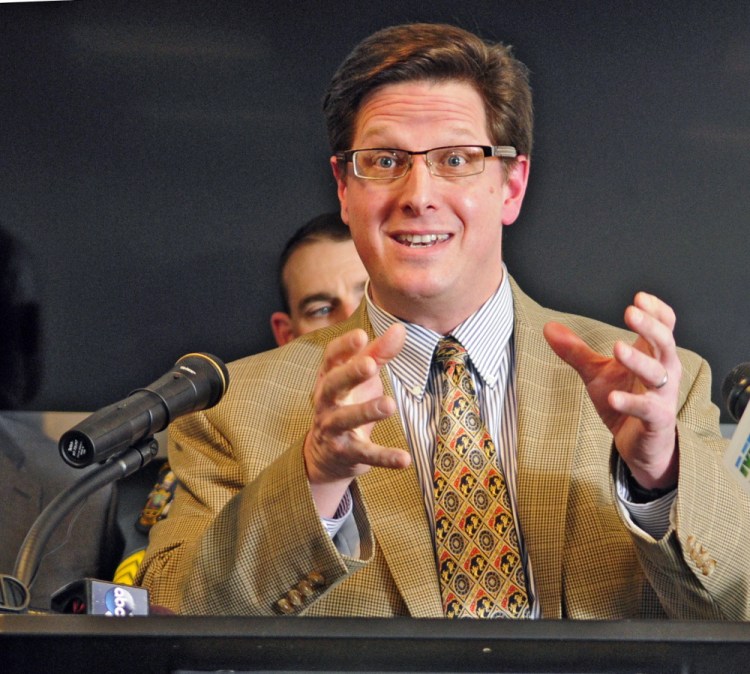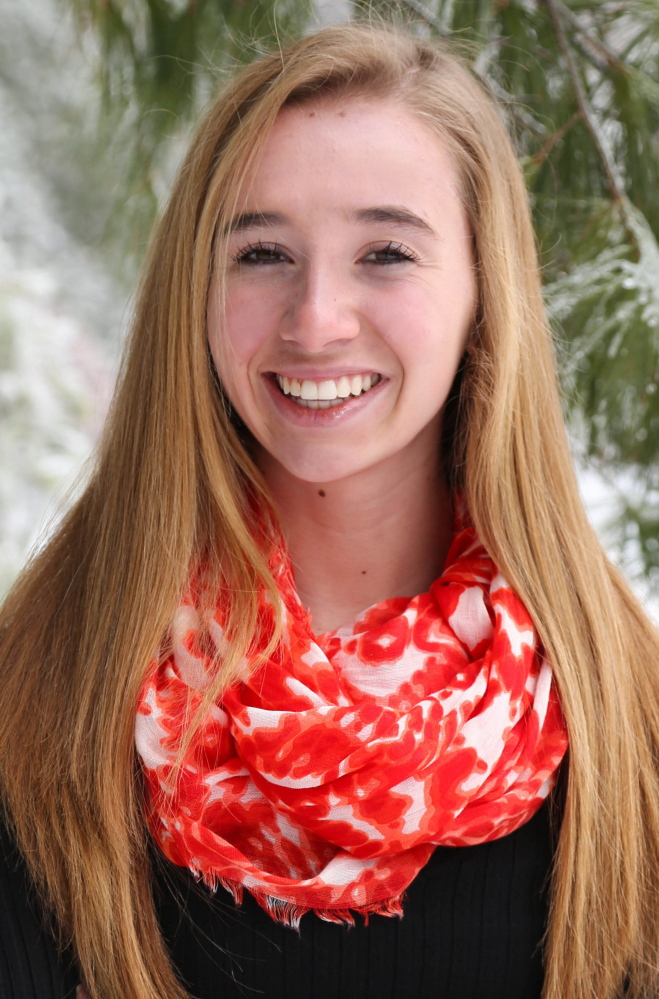Androscoggin County District Attorney Andrew Robinson erred Wednesday when he said the driver of a hayride that crashed Oct. 11, killing a 17-year-old Oakland girl, had been charged with manslaughter and other felonies.
In fact, the driver was charged only with reckless conduct, a misdemeanor, according to a statement that Robinson released Thursday to apologize for announcing the incorrect charges against David Brown, 55.
Brown was driving the 1979 Jeep CJ5 that was towing the trailer the night of the crash. Cassidy Charette of Oakland died in the accident and more than 20 other passengers were injured.
“This morning I learned that although the grand jury signed an indictment charging manslaughter, aggravated assault, driving to endanger and reckless conduct, in reality they had only voted to support a charge of reckless conduct,” Robinson’s statement said. “This clerical error should have been caught before I issued the press release.”
The grand jury did indict Harvest Hills Farms, a corporation, on charges of manslaughter, aggravated assault, driving to endanger and reckless conduct. It did not indict the farm’s owner, Peter Bolduc.
Reckless conduct is a Class D misdemeanor, punishable by up to a year in jail and a $2,000 fine, while manslaughter and other class A felonies are punishable by up to 30 years in prison and a $50,000 fine. A person is guilty of reckless conduct if he or she “recklessly creates a substantial risk of serious bodily injury to another person,” according to state law. Manslaughter means recklessly causing the death of someone.
Robinson said his office takes pride in being accurate with information and in keeping the public informed, but that the late hour – the indictment was handed up at 6:30 p.m. after a day of deliberations – and speed with which the District Attorney’s Office was processing the information resulted in the mistake.
Robinson did not return a call for comment, and messages left for Brown and his family members had not been returned Thursday night.
The grand jury meets in private when it votes on whether there is probable cause to charge a person. Prosecutors, defense attorneys and defendants are not present, said Stephen Schwartz, a former prosecutor and past president of the Maine Association for Criminal Defense Lawyers.
An indictment requires two-thirds of the people sitting on a grand jury to vote for a charge. The decision is communicated by a document that lists the charges and is signed by the grand jury foreman and then presented to the district attorney, according to state statute.
The attorney for Charette’s family, Jodi Nofsinger of Berman & Simmons, said Robinson informed the Charette family about the error in Brown’s charges before announcing it publicly. She said the change does not alter the family’s reaction.
“They have very much taken positions all along that what charges are brought is up to the District Attorney’s Office and grand jury,” Nofsinger said. “They have really chosen in a healthy way to focus on their daughter and her memory and celebrate who she was.”
At some point, the family will likely move forward with a wrongful-death lawsuit, she said.
“The reason for the civil lawsuit isn’t necessarily about money for money’s sake. … If they can bring some awareness or change somebody’s behavior to prevent even one other family from experiencing this tragedy then they believe taking that action is necessary,” Nofsinger said. She believes the farm has between $7 million and $11 million in liability coverage. Any proceeds from a suit will be used to “extend into the world the love and kindness Cassidy would have given herself if she were here.”
FARM OWNER HURTS FOR FAMILIES
Although the owner of Harvest Hill Farms expressed relief after Robinson opted not to seek an indictment against him personally in the hayride crash, he remains “deeply saddened” by the injuries and pain to the families involved, his attorney said Thursday.
“His first response was that he is physically, emotionally and financially exhausted,” said Michael Whipple, of Hallett, Zerillo & Whipple, who represents Peter Bolduc. “What that comes from is the pain that he witnessed that night, the pain he understands the families have experienced and – not to be focused on him – but the pain it has inflicted on his own family.”
Robinson said in a written statement Wednesday that he chose not to seek an indictment against Bolduc because the investigation showed there was a substantial chance it would not lead to a conviction.
After months of investigation and consideration, a grand jury returned indictments of manslaughter, aggravated assault, driving to endanger and reckless conduct against the farm itself as a corporation. Corporations can be charged criminally under Maine law, said Schwartz, of the defense lawyers association. Although they cannot serve jail time, corporations can be fined and put on probation.
“The Legislature passed the law presumably not only to hold people accountable, but as a safety reason,” he said. “The question is whether it’s worth spending resources to send that kind of message … in a case in which the only penalty can be a fine and where there’s civil liability as well.”
Whipple said Bolduc was the primary target of the investigation and cooperated fully, including taking a polygraph test with Maine State Police to back up his assertion that he had no knowledge that the Jeep had brake problems.
“The only thing he could do to make this right for his family, himself and for the families involved in the accident was to cooperate. He did something I rarely see people under investigation do, which is be transparent,” Whipple said.
The grand jury met on three separate occasions over three months to consider the case and to support the investigation. Bolduc was one of the witnesses called to testify before the grand jury.
SOMEONE DIDN’T ADD BRAKE FLUID
The investigation focused on the Jeep towing the trailer. The Jeep’s braking mechanism was in working order and even had new parts, but the amount of brake fluid in the vehicle’s system was very low, and was inadequate to stop the vehicle once it started going down the hill just before it crashed, Whipple said.
Whipple maintains the Jeep was capable of towing the trailer, and that Bolduc demonstrated that as recently as Wednesday when he loaded concrete Jersey barriers onto the trailer to simulate the weight of more than 20 passengers, then drove the course at twice the normal speed.
“Our belief is the reason it didn’t work was because somebody didn’t fill the brake lines with fluid,” he said. “Our investigation established somebody didn’t do their job.”
At least part of that responsibility fell on Peter Theberge, 38, the farm mechanic, who also was indicted Thursday. Theberge was charged with reckless conduct, a misdemeanor. He could not be reached for comment.
Part of the reason why Brown was charged is because he has a commercial driver’s license, which gives him additional expertise and responsibility, Whipple said. As the driver, Brown also would have been aware if the brakes were not operating properly.
It’s not clear whether the erroneous grand jury charging document, saying Brown faced serious felonies including manslaughter, indicates that Robinson tried to persuade the grand jury to charge those crimes. Grand jury deliberations are confidential.
Bolduc designated the Jeep for towing the trailer, as he had in previous years, because it operated better than the farm tractors and also because it didn’t block passengers’ view of the attractions like the tractors did, Whipple said. The Jeep had no cap over the passenger compartment, he said.
The grand jury’s decision to indict Harvest Hill Farms is similar to charging a conspiracy, Whipple said, “looking at the company as a whole being responsible for these families and children.”
Though not charged criminally, Bolduc may face civil lawsuits in Charette’s death and the injuries to passengers.
Bolduc – who owns several companies – filed for Chapter 11 bankruptcy protection on behalf of Andover Covered Bridge LLC, the corporation that owns the land on which the farm and other enterprises are tenants. He listed three personal injury claims stemming from the crash as the top creditors owed money, although he did not list how much potential liability the company faces.
Send questions/comments to the editors.





